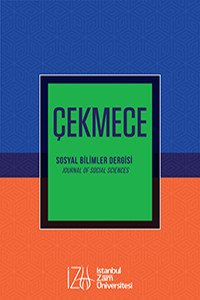Afrofütürizm’in Postkolonyal Çalışmalar ve Psikoanaliz Teori ile Bağlantısı
Ralph Ellison ve Zora Neale Hurston’ı Afrofütürizmin erken biçimlerinin gelişimine katkıda bulunan yazarlar olarak nitelendiren belirli sayıda bilim insanı olmasına rağmen, bu çalışmaların çoğu teknoloji ve gelecek üzerine odaklanmıştır. Yapılan bu çalışmalarda bu tür erken Afrofütüristik eserlere genel olarak dekolonizasyon ve psikoanaliz teori bağlamında yaklaşılmamıştır. Bu çalışmada Their Eyes Were Watching God ve Invisible Man adlı eserlerin, yazarlarının alternatif gelecek üretmek adına kullandıkları alternatif alanlar ve teknolojik söylemlerden dolayı nasıl erken Afrofütüristik eserler olarak değerlendirilebileceği tartışılmaktadır. Afrofütürizmi, spekülatif kurgu ve bilim kurgudan ayıran en belirgin özellikler arasında köklerinin kolonyalizme dayalı olması bulunmaktadır. Bunun yanında özellikle Afrikan-Amerikan kadın karakterleri ve teknolojik gelişmeleri Afrikan motifleri içerisinde ele almaktadır. Bu çalışma, Zora N. Hurston’ın ve Ralph Ellison’ın bahsi geçen eserlerinin Afrofütürizm akımının gelişmesine katkı sağlayan eserler olarak categorize edilmesine yardımcı olmaktadır. Erken Afrofütüristik eserler arasında paralellik sağlamak adına romanlardaki ana kahramanlar, içinde bulundukları durumlar ve değişimleri—hem fiziksel hem mental olarak—ele alınmıştır. Detaylı açıklamak gerekirse, bu çalışmada Afrofütürizm’in kilit noktaları olan zaman ve yerlerin, post-kolonyal teori çerçevesinde, alternatif alanlar olarak kullanılmasına, fragmentasyon sürecindeki karakterlerin psikoanalitik teori çerçevesinde kimliklerine yapılan vurguya ve dil kullanımının tasvirine odaklanılmaktadır.
Anahtar Kelimeler:
Afrofütürizm, proto-Afrofütürizm, dekolonizasyon, alternatif alanlar, post-kolonyal, psikoanalitik teori, African American literatür
Afrofuturism’s Association with Post-Colonial Studies and Psychoanalytic Theory
Although there have been a few scholars that have characterized Ralph Ellison and Zora Neale Hurston as writers who have contributed to the development of early forms of Afrofuturism, these studies do not approach such early Afrofuturistic works in the context of decolonization and psychoanalytic theory mainly due to the heavy interest given on technology and future. This article will focus on how Hurston’s Their Eyes Were Watching God and Ellison’s Invisible Man can be categorized particularly as proto-Afrofuturist works because of the writers’ use of decolonized alternative spaces and technological discourse to generate alternative futures. The protagonists, their state of beings and transformations—both physical and mental—are analyzed accordingly to draw parallelism within the proto-Afrofuturistic scope. The analysis also helps to categorize the works of Hurston and Ellison as novels that have contributed to the development of the Afrofuturism as a movement. More specifically, this article will focus on a discussion on the key aspects that constitute Afrofuturism including the use of settings in the novels as alternative spaces, as well as the depiction of the characters’ identity and language in psychoanalytic theory in terms of fragmentation and decolonization of the characters within a reading of Afrofuturism.
Keywords:
Afrofuturism, proto-Afrofuturism, decolonization, alternative spaces, post-colonial, psychoanalytic theory, African American literature,
___
- Anokye, Akua D.: “Private Thoughts. Public Voices: Letters from Zora Neale Hurston,” Women: A Cultural Review, Vol.XII, 1996, pp.150-159.
- Bhabha, Homi K.: The Location of Culture, London, Routledge, 1994.
- Bhabha, Homi K.: “The Third Space. Interview with Homi Bhabha,” Identity: Community, Culture, Difference, Ed. by Jonathan Rutherford, London: Lawrence and Wishart. 1990, pp.207-221.
- Dery, Mark: “Black to the Future: Interviews with Samuel R. Delany, Greg Tate, and Tricia Rose,” Flame Wars: The Discourse of Cyberculture, Ed. by Mark Dery, Durham, Duke University Press, 1994, pp.179-222.
- Ellison, Ralph: Invisible Man, New York, Vintage Books, 1982.
- Fanon, Frantz: Black Skin, White Masks, Trans. by Charles Lam Markmann, New York, Pluto Press, 2008.
- Hurston, Zora N.: Their Eyes Were Watching God, New York: HarperCollins Publishers Inc., 2000.
- Johnson, Charles: “Novelists of Memory,” I Call Myself and Artist: Writings by and About Charles Johnson, Indiana, Indiana University Press, 1999.
- Lacan, Jacques: Écrits. A Selection, Trans. by Alan Sheridan, London: Routledge, 2005.
- Lacan, Jacques: The Four Fundamental Concepts of Psycho-Analysis, Trans. by Alan Sheridan. New York: Norton, 1978.
- Lacan, Jacques: The Seminar. Book III. The Psychoses, 1955–56, Trans. by Russell Grigg. London: Routledge, 1993.
- Lacan, Jacques: The Seminar. Book XI. The Four Fundamental Concepts of Psychoanalysis, 1964, Trans. by Alan Sheridan, London: Hogarth Press and Institute of Psycho-Analysis, 1977.
- Lacan, Jacques: The Seminar of Jacques Lacan, Book II: The Ego in Freud's Theory and in the Technique of Psychoanalysis, Trans. by Sylvia Tomaselli, New York, Norton, 1991.
- Leitch, Vincent B. et. al.: The Norton Anthology of Theory and Criticism, London, W. W. Norton and Company, 2001 . Lieber, Todd M.: “Ralph Ellison and the Metaphor of Invisibility in Black Literary Tradition,” American Quarterly, Vol.II, No:1, March 1972.
- Miralles, Alejandro Lopez: “Invisibility and Blindness in Ellison’s Invisible Man and Wright’s Native Son,” Philologica Urcitana: Revista Semestral de Iniciación a la Investigación en Filología, Vol.IX, (Online) http://www.ual.es/revistas/PhilUr/pdf/PhilUr09.4.LopezMiralles.pdf, 05 January 2017.
- Nelson, Alondra: “Afrofuturism,” 2000a, (Online) http://www.afrofuturism.net, 14 February 2017.
- Rieder, John: Colonialism and the Emergence of Science Fiction. Middletown: Wesleyan University Press, 2008.
- Szeman, Imre: “System Failure: Oil, Furuturity, and the Anticipation of Disaster.” South Atlantic Quarterly, Vol.CVI, No:4, 2007, pp.805-823.
- Başlangıç: 2012
- Yayıncı: İstanbul Sabahattin Zaim Üniversitesi
Sayıdaki Diğer Makaleler
Kâtip Çelebi: Doğu ve Batı’yı İlimde Birleştiren Bir Dehâ
Türk Ceza Hukukunda İrtikâp Suçu
Dijitalleşme ve Sosyal Hizmet: Sosyal Hizmet Yönetiminde Dijitalleşme
Doç. Dr. Zafer Duygu İle Dinler Tarihi Eksenli Bir Söyleşi
Afrofütürizm’in Postkolonyal Çalışmalar ve Psikoanaliz Teori ile Bağlantısı
